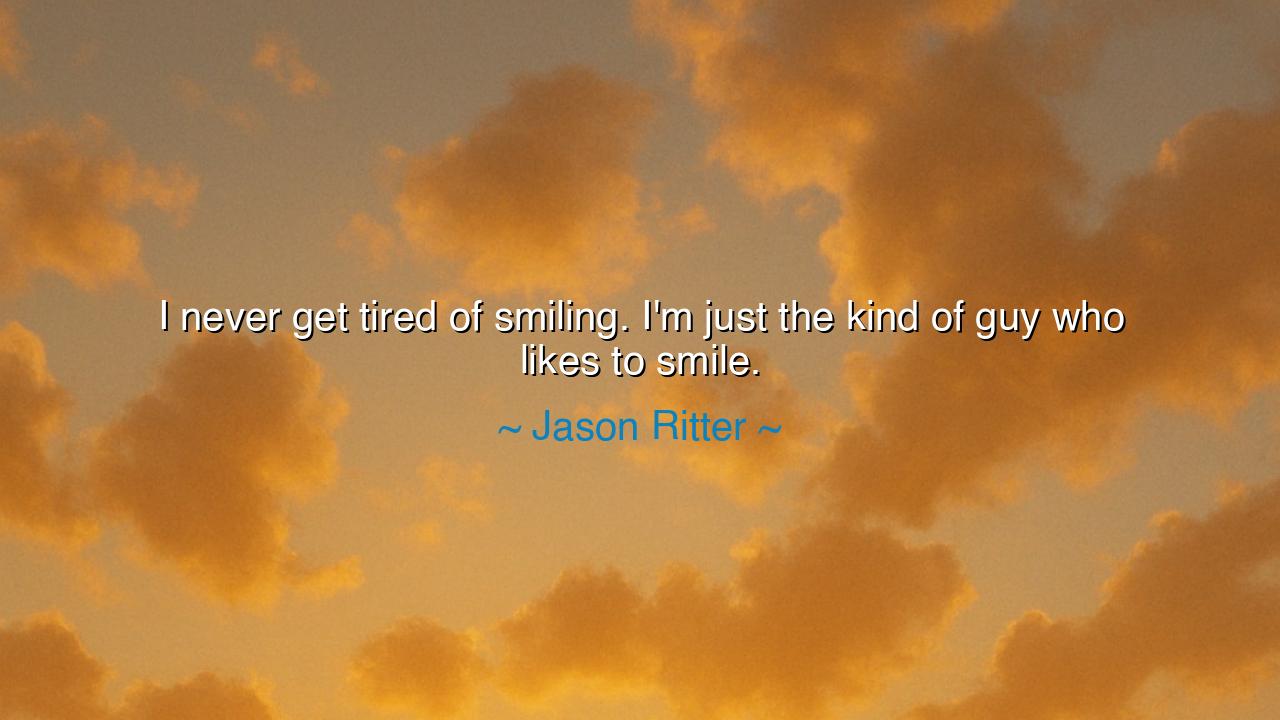
I never get tired of smiling. I'm just the kind of guy who likes






Hear now the gentle yet profound words of Jason Ritter: “I never get tired of smiling. I’m just the kind of guy who likes to smile.” At first hearing, it may seem a simple jest, a light confession from a man of joy. Yet within this humble phrase lies a truth as ancient as the stars—that the smile is no mere movement of the lips, but a radiance of the soul. It is the outward flame of an inward light, a gift that costs nothing yet enriches both giver and receiver. Ritter, in his simplicity, reminds us that there is sacred strength in choosing gladness.
The ancients knew well that to smile in the face of hardship was an act of valor greater than lifting the sword. For when the body smiles, the heart remembers hope, and those around are drawn into the warmth of unseen fire. A smile can be the shield that guards against despair, the banner that rallies weary spirits, the bridge that spans the gulf between strangers. To “never get tired of smiling” is to declare one’s allegiance to light, to vow never to let the shadows rule one’s countenance.
Consider the tale of Mother Teresa, who walked through the poorest streets of Calcutta, where hunger gnawed and sickness lingered. She possessed neither wealth nor armies, yet she bore one weapon the world could not resist: her smile. When she touched the forgotten, when she cradled the dying, her smile whispered of dignity and love. It was said by many that her smile was enough to lift the burden of a lifetime, if only for a moment. In her we see Ritter’s words made manifest: the kind of soul who does not tire of smiling, because the act itself is a ministry of love.
But do not mistake this joy for naivety. To smile amidst sorrow is not to ignore pain but to defy it. It is a heroic stance, declaring that darkness may strike the body but shall not consume the spirit. There is a quiet power in this choice, for it says to the world: “You may wound me, yet still I rise in gladness.” Such smiles are not empty—they are forged in courage, polished in patience, and crowned with resilience.
When Ritter speaks of being “the kind of guy who likes to smile,” he speaks also of identity. He is not merely describing an action, but a way of being. To smile freely is to live generously. It is to carry oneself as a bearer of peace, to spread comfort where one walks. Such a person transforms rooms, alters moods, and stirs hope, not through speeches or wealth, but through the unassuming power of joy embodied.
The lesson is clear: let your smile be your offering to the world. Let it be a torch in moments of despair, a gift to the stranger, a comfort to the friend, a balm to the weary. Train your heart to rejoice in small things, and your lips will naturally reflect that gladness. Do not hoard your smiles as though they were scarce coins; spend them freely, and see how they return to you multiplied.
Therefore, beloved, make it your practice: each morning, greet the dawn with a smile, for in doing so you welcome the day as a companion. In moments of tension, soften the edge of anger with a smile, and you will see walls fall. And when life’s storms rage, remember Ritter’s wisdom: never grow tired of smiling. For the world does not need more conquerors—it needs more bearers of joy. And perhaps, in the end, the mightiest legacy of any life will be found in the smiles it left behind.






AAdministratorAdministrator
Welcome, honored guests. Please leave a comment, we will respond soon